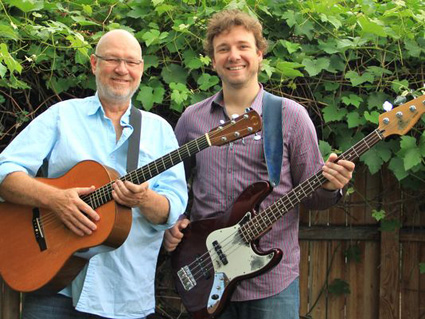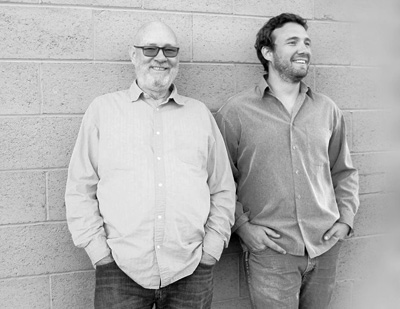Doug and Aaron Haywood Team Up for Feb 21st Concert
By Mariah Fleming

DDoug Haywood is a singer-songwriter-musician who has worked with some of the most iconic musicians of the last four-plus decades. Haywood has a list of credits that is mind blowing. "I'm the most famous musician nobody's heard of!" he says. Doug's son Aaron Haywood plays bass for the popular Denver based Celtic rock band "The Indulgers." Father and son are appearing together in a special concert in Phoenix on Saturday February 21st. The concert will be held in the Quaker Room at Fiddler's Dream Coffeehouse at 8:00 PM.
The average music listener may not have heard of Doug Haywood, but he's certainly well known to the many iconic musicians with whom he has worked. The short list includes Jackson Browne, who he's toured with (and continues to do so) for twenty years. The list includes artists like Linda Ronstadt, Graham Nash, the late Warren Zevon and many others. It's a very long list of touring and recording credits. Recently Jackson Browne and Doug Haywood reunited to record Browne's new release "Standing In the Breach." Haywood sang harmonies on the new album, which was released last October.
Doug Haywood is not a name-dropper, even though he is one of the preeminent 'sidemen' in the music industry. People who follow his music appreciate his superlative talent, humility and humor. He's co-written many songs with people like with Jack Tempchin who wrote "Peaceful, Easy Feeling." Haywood's own songs have been recorded by artists such as David Lindley, Bobbie Gentry, The Dillards, Mason Williams, Jennifer Warnes, Juice Newton and Jerry Reed. He had a top ten hit with "If it Ain't Love by Now" recorded by Jim Ed Brown and Helen Cornelius. He was also on SNL when the original cast was there and Steve Martin was host.
Haywood's got connections to Arizona music that go way back to the Mews and the Blue Goat Pub 'coffee house' days. Long time Valley residents will remember the Mews and the Blue Goat Pub as a bit of a circa late 1960's early 1970's Greenwich Village vibe in Scottsdale (and believe me, those WERE the days!) In that tradition, the Valley still has Fiddler's Dream, a 30 plus year old Phoenix gem which has hosted much great music over the years. If you've been there, you know what I mean. If you haven't, here's your chance to experience a stunner at this concert. Tickets for Doug and Aaron Haywood are $15 day of show and $10 ahead of show at www.brownpapertickets.com. For more info call 602 997 9795.
Doug and I 'chatted' via email and phone. The interview, which appears below, turned out to be as magnetic as his music.
Q. Since the 1960's you've been one of the preeminent 'sidemen' in the music business. As a songwriter, you'd easily be a contender for the Songwriter's Hall of Fame. If you had it to do over again, do you think when you started out you would have focused on your own songwriting and performing as a solo artist?
A. "If I had it to do over again" is an amazing concept to me. We all get to do life once, (as far as I know.) So it comes down to regrets, which I'm not allowed on my spiritual health regime. I am compelled to approach each day as though my past has led me to the place I'm at; a place where I may be useful to myself and others. I've learned a lot about many things. But we're here to talk about "the music business," and therefore we're talking about something that is changing and/or disappearing, depending on how you look at it.
Q. What went into your decision to become a musician (a "sideman") and not pursue a solo career early on?
A. I became aware of the fact early on that becoming skilled as an accompanist was a way to earn a living. I hoped that it would also lead to making contacts (it's now called "networking") and lead to getting songs onto people's albums. This would provide the income and fame necessary to keep on going. My theories didn't work. Instead, life happened. Life had its own plan. To be a musician one must get control of one's product: yourself.
Q. When did you and your son Aaron begin working together?
A. Aaron started playing my music with me when he was about 14. We started performing together by the time he was 19. We did it mainly so that we could travel to new places in the great outdoors where we could hike, camp and explore.
Q. Will your concert be a performance of all original music?
A. I normally perform some of my own songs, but I think it's tiring for an audience to hear one song after another that they've never heard before, so we do a lot of songs that you've probably heard before. We do them in our own way. We sing a few Everly Brothers songs.
Q. Who were your early influences?
A. The Everly Brothers influenced me, so did the Beatles, and everyone else. When I played in Las Vegas with Bobble Gentry when I was 20, I went up to the top of the Landmark Hotel to hear the Everlys every night between Bobbie's shows. Warren Zevon was the Everly's piano player. I was so focused on the Everly Brothers that Warren Zevon's name went in one ear and out the other. Years later Warren reminded me that he'd played piano for the Everly Brothers; when we were touring the states together promoting his first album."

Q. Were others in your family musical?
A. I have two brothers, and when we were kids I forced them to sing Everly Brothers songs with me. I didn't care how long it took to teach them their part. I had to hear that blend out in the air around us. But I drew the line at quitting. If they tried to quit I'd have to hit them. That's how our father taught us to handle everything; with our fists. Of course, it doesn't work. My brother Dennis, by the way, played upright bass for a few months with our old local (Phoenix) bluegrass band, The Tuckers.
Q. Did you play an instrument when you were a kid?
A. I played clarinet in the high school marching band. I hated marching, and when I heard the Beatles I knew I didn't have to live in that dismal marching world much longer. The world could be a beautiful place even if your brothers wouldn't sing their parts right. So I allowed them to retire from music, but I was just getting started.
Q. You've been writing your own songs since an early age. Has your writing process changed much over the decades?
A. My writing process has changed. Recording, which is easier now than it was years ago, has become more a part of the process. Since I don't live in Los Angeles anymore, co-writing has become much less frequent.
Q. Your first solo album was "Nevada" in 1996. Your second was 2004's "In These Rooms" and you released "6 Songs" in 2014. Is your main focus on songwriting these days?
A. Right now I'm staying in shape to do these small shows. I've never been a booking agent, so rather than staying in shape by playing lots of shows, I have to dig down inside for enough discipline to rehearse on my own between these infrequent shows.
Q. You're working on a new release. Can you tell us about it?
A. My new album will have new songs and old songs. I don't know much about it right now, but I know it'll have few instruments. I can't afford to spend the kind of money I used to spend making these recordings, but it will have all the quality I can put into it with love and hard work.
Q. You were in the thick of the headiest days of a great generation of music. Did you keep a journal?
A. I've kept a journal sporadically. There are words and pictures. Lately, in the last 3 years, I've gotten more organized. I wrote a short story about meeting Jerry Lee Lewis. I wrote a story about trying to find enough money to see "A Hard Day's Night" when it came out.
Q. Have you considered writing a book?
A. Maybe I'm too lazy to be a writer. It requires a lot of work. Also, you have to be courageous. I don't know that I'll do that. I certainly have no intention to write a book about meeting famous people. That's the world we live in, but writing requires so much of you; I'd hate to waste it on trying to please an artistically pathetic society; the one that watches “reality T.V.”
Q. With today's impersonal music industry monopoly, originality doesn't seem to be appreciated so much. What do you think about musicians who "sample" other people's original work for use on their own projects?
A. As long as the artist pays for his materials then I say go ahead, explore your craft. There are rules for sampling, ways to pay the writers and publishers of the song from which the recording is sampled. I think sampling is like decoupage. It's making something new out of bits and pieces, you know? Like cutting pictures from a magazine and pasting them onto your canvas. I have respect for what is done in that regard, though I don't listen to much of that stuff.
Q. In today's music industry can a songwriter really protect his or her own work?
A. No, a songwriter can't really protect his or her work. But you do the best you can. That's the lesson I learned late, but not too late. Don't be a perfectionist. Do the best you can.
February 8, 2015
Contact the author of this article at Editor@MusicAndMoreAZ.com.